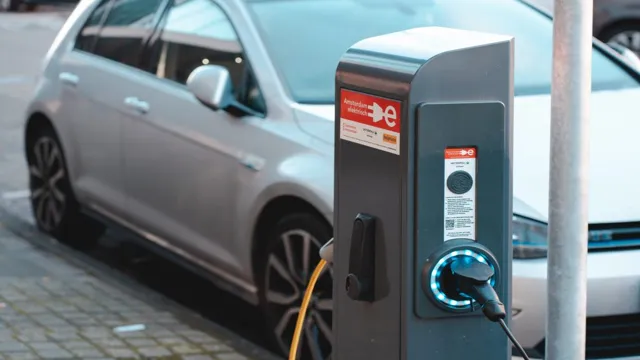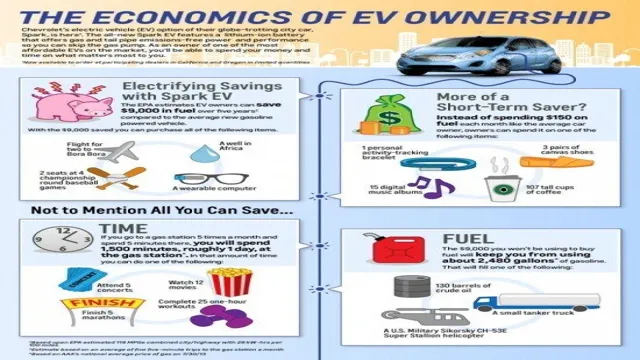Electric Cars Unlocked: Discover the Lucrative Tax Benefits of Owning One
Have you ever considered purchasing an electric car? Not only are they great for the environment, but there are also numerous tax benefits that come along with owning one. Investing in an electric car can not only save you money in the long run but can also give you significant tax breaks. Imagine enjoying a cleaner and more eco-friendly ride while being rewarded for your decision with tax incentives- sounds too good to be true, right? Well, it’s not! Keep reading to find out more about the tax benefits of owning an electric car and why it may be the right choice for you.
Federal Tax Credits
If you’re thinking about buying an electric car, you’ll be happy to know that there are several tax benefits to consider. Federal tax credits are available for those who purchase electric vehicles, which can help offset the cost of the car. The amount of the tax credit varies depending on the model of the car and the year it was purchased.
Generally, the tax credit ranges from $2,500 to $7,500. The amount of the tax credit is also dependent on the battery size of the vehicle. For example, a car with a larger battery will typically qualify for a higher tax credit.
It’s important to note that these tax credits are only available for new electric cars, not used ones. However, the good news is that the tax credit is applied directly to your taxes owed, which means that you’ll see the benefits right away. So, if you’re thinking about buying an electric car, don’t forget to consider the tax benefits available to you.
It could make all the difference in affording the car of your dreams.
Up to $7,500 in tax credits for new EVs
If you’re in the market for a new electric vehicle (EV), you may be able to take advantage of a federal tax credit of up to $7,500. This credit can help offset the higher upfront cost of an EV and make it a more affordable option. The amount of the credit varies depending on the size of the vehicle’s battery and its expected range.
For example, a smaller EV with a range of 75 miles or less is eligible for a $2,500 tax credit, while a larger EV with a range of 200 miles or more can receive the full $7,500 credit. It’s important to note that this credit is not a deduction, but rather a credit against the amount of tax you owe. In other words, if you owe $7,500 in federal taxes and purchase an EV that qualifies for the full credit, your tax bill would be reduced to $0.
Keep in mind that this credit is limited to the first 200,000 EVs sold by each manufacturer, so if you’re considering purchasing an EV, it’s important to act soon before the credit phases out.

Credit based on battery capacity
If you are in the market for an electric vehicle, then it pays to know about the Federal Tax Credits available to you. These credits vary depending on the battery capacity of the vehicle, with higher-capacity batteries receiving a larger credit. The maximum tax credit available is $7,500, but this is only applicable to vehicles with battery capacities of 16 kWh or more.
Vehicles with smaller battery capacities may still be eligible for a credit of up to $4,502, depending on the specifics of the model. It’s worth keeping in mind that these tax credits are only available for a limited time, so it’s important to take advantage of them while you can. By going electric and taking advantage of the Federal Tax Credits, you can not only reduce your carbon footprint but also save money in the process.
Phase out once 200,000th EV sold by manufacturer
If you’re thinking about buying an electric vehicle (EV), you may be eligible for a federal tax credit. The tax credit is available for the first 200,000 EVs sold by each manufacturer, after which it begins to phase out. This means that the amount of the credit decreases over time until it is eventually eliminated.
It’s important to note that the tax credit is not a cash rebate, but rather a reduction in the amount of taxes you owe. So if you owe $5,000 in taxes and you qualify for a $2,500 tax credit, you would only owe $2,500 in taxes. It’s a great incentive to buy an EV, but it’s worth checking with your manufacturer to see if they’ve hit the 200,000 vehicle limit yet.
Once they do, the tax credit will start to phase out, so you’ll want to buy your EV sooner rather than later to take advantage of the full credit.
State Tax Credits
One of the most appealing features of buying an electric car is the tax benefits that come with it. Electric vehicle owners can take advantage of state tax credits, which can greatly reduce the overall cost of purchasing and owning the car. These tax credits vary by state, with some offering larger incentives than others.
In California, for example, electric car buyers can receive a tax credit of up to $2,500, while in Colorado, the credit can be as high as $5,000. By reducing the cost of ownership, these tax credits make electric vehicles even more attractive to potential buyers. Not only are electric cars environmentally friendly, but they can also be a financially savvy choice for drivers looking to save money.
Plus, with more and more states committing to reducing greenhouse gas emissions, we can expect to see tax credits for electric cars continue to be a popular incentive in the coming years. So, if you’re considering buying an electric car, be sure to research the state tax credits available in your area and take advantage of the savings!
Varies by state, some offering up to $5,000
State tax credits can vary significantly by location but can be a great way for individuals and businesses to save money on their taxes. Depending on the state, tax credits can range from a few hundred dollars to as much as $5,000. These credits are often designed to incentivize behaviors or investments that are seen as beneficial to the state’s economy or environment.
For example, some states offer credits for companies that hire and train new employees or for those who invest in renewable energy. Individuals can also benefit from tax credits, such as those offered for installing energy-efficient appliances or making charitable donations. With careful planning and research, state tax credits can be a powerful tool for reducing tax burdens and achieving financial goals.
Check with local authorities for eligibility
When it comes to state tax credits, it’s important to understand that eligibility requirements can vary depending on where you live. This is why it’s always a good idea to check with your local authorities to determine if you qualify. While some states offer tax credits for things like solar panel installation or electric vehicle purchases, others may offer credits for rehabilitating historic buildings or contributing to a state-sponsored organization.
Regardless of the specific credit, it’s important to do your research in advance to ensure that you take advantage of any tax breaks that you’re entitled to. So, if you’re unsure whether you’re eligible for state tax credits, be sure to reach out to your local authorities and get the information you need. Who knows? You could end up saving a bundle come tax season!
Additional Benefits
One of the biggest advantages of buying an electric car is the various tax benefits that come with the purchase. Depending on the country or state, there are plenty of incentives that encourage customers to switch to electric vehicles. For instance, the US federal government offers a tax credit of up to $7,500 for qualifying electric cars.
Additionally, many states offer rebates of up to $5,000 for electric car purchases, while some also waive sales tax or registration fees. Beyond governmental incentives, electric cars also come with reduced maintenance and operating costs compared to gasoline-powered vehicles. They have fewer moving parts and require less fuel, resulting in lower expenses over time, especially for those who frequently travel long distances.
Overall, as the world continues to prioritize sustainability and green energy, electric cars have become a viable and practical option for a growing number of drivers, not only for their positive impact on the environment but also for the monetary benefits they offer.
Reduced carbon emissions = potential state and local incentives
One of the main benefits of reducing carbon emissions is the potential for state and local incentives for businesses and individuals who make an effort to reduce their environmental impact. In many states, there are tax credits and other financial rewards available to companies that invest in renewable energy or adopt strategies that reduce their carbon footprint. These incentives not only help reduce the financial burden of businesses looking to become more environmentally friendly but also encourage other businesses to follow suit.
In addition, many local governments have implemented policies that reward individuals for using alternative forms of transportation, such as biking or walking, rather than driving. By participating in these programs, individuals can save money on transportation costs while also helping to reduce traffic congestion and carbon emissions. Overall, the benefits of reducing carbon emissions extend far beyond just the environmental impact and can have positive financial and social implications as well.
Lower maintenance costs compared to gas-powered cars
When it comes to owning a car, maintenance costs can add up quickly, especially with gas-powered vehicles. However, electric cars offer lower maintenance costs due to their simpler design and fewer moving parts. For example, electric cars don’t require oil changes, transmission fluid, or spark plugs, reducing the need for regular maintenance.
Plus, electric cars don’t emit harmful fumes, reducing the risk of engine damage and therefore, reducing maintenance needs. This means that while electric cars may have a higher upfront cost, they can save you money in the long run, making them a more economical choice. Overall, investing in an electric car not only helps the environment but also makes good financial sense, so why not give it a try?
HOV lane access and reduced toll fees in some areas
If you’re someone who commutes to work every day, you’ll be glad to know that there are some additional benefits to getting an Express Lane transponder. Depending on your state, you may be able to access HOV lanes with your transponder, without having to meet the normal occupancy requirements. This can be a great time-saver, especially during busy rush hour traffic.
In some areas, you may also be eligible for reduced toll fees when you use the Express Lane. This can potentially save you a lot of money over time, especially if you commute regularly. So not only will you be able to breeze through the toll plaza quicker, but you’ll also get some additional perks that can make your commute a little easier on your wallet.
Overall, getting an Express Lane transponder can be a great investment if you’re someone who spends a lot of time on the road.
Conclusion
In conclusion, the tax benefits of buying an electric car are shockingly beneficial. Not only do you get to reduce your carbon footprint, but you can also take advantage of federal and state tax incentives that could save you thousands of dollars. It’s a win-win for both the environment and your wallet.
Plus, think of all the money you’ll save on gas! So, if you’re in the market for a new car, let electricity power your ride and reap the tax benefits that come with it. Your wallet (and the planet) will thank you.”
FAQs
What are some of the tax benefits of buying an electric car?
Electric car owners may be eligible for federal tax credits up to $7,500, state tax credits and rebates, as well as lower car registration fees and no sales tax in some states.
Do all electric cars qualify for tax benefits?
No, tax credits and rebates vary by state and vehicle model. Check with your local Department of Motor Vehicles or tax agency to see what incentives are available for the car you plan to purchase.
Can I claim a tax credit for buying a used electric car?
No, the federal tax credit only applies to new electric car purchases. However, some states offer incentives for purchasing used electric cars.
Are there any downsides to buying an electric car related to taxes?
Depending on where you live, your electric car may be subject to annual “road usage fees” to make up for the lost gas tax revenue. Be sure to check with your state’s DMV for more information.




